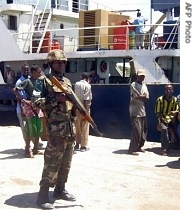-
(单词翻译:双击或拖选)
Nairobi
18 May 2007
In Uganda, the deaths of four peacekeepers in the Somali capital, Mogadishu, this week have prompted calls for President Yoweri Museveni to withdraw his military troops from the African Union mission. As VOA Correspondent Alisha Ryu reports from our East Africa Bureau in Nairobi, the Ugandan government is sending mixed signals about how long it intends to remain committed to efforts to stabilize1 Somalia.
 |
| Ugandan Africa Union peacekeepers patrol the international sea port in Mogadishu, 08 May 2007 |
But media reports say since four peacekeepers were killed and five more wounded in a roadside bombing Wednesday, public opinion, especially in the Ugandan capital, Kampala, has moved sharply against keeping the troops in Somalia longer than the six-month mandate4.
The reports say many Ugandans are concerned that the African Union mission in Somalia is diverting money, manpower, and resources away from efforts to resolve conflicts at home, including the long-running civil war against Lord's Resistance Army rebels in the north of the country.
There is also a growing belief in Uganda that President Yoweri Museveni pushed for a rapid deployment5 of troops largely to appease6 the United States.
After Ethiopian-led forces defeated Somalia's Islamic Courts Union in late December, Washington led international efforts to raise an 8,000-member peacekeeping force to protect Somalia's fragile secular7 interim8 government and to train its security forces.
Aggrey Awori is a Ugandan political analyst9 and an adviser10 to President Museveni. He says Uganda sent troops to Somalia because it is the duty of African nations to help one another in times of crisis.
"Anybody knows that once you take on a military mission, death is always facing you," he said. "What has happened is very unfortunate [but] it should not change or move us from our original course. We did not go to Somalia on a bilateral11 basis, between Mogadishu and Kampala. It was an African Union commitment. Somalia is an African country. So, we are expecting other colleagues in the organization to answer the call."
But ordinary Ugandans complain about the lack of action by other African Union member states.
Despite pledges from several other African countries, including Nigeria, Malawi, and Burundi, to send troops to Somalia, none have yet been deployed12.
In another blow to Uganda, the Addis Ababa-based African Union acknowledged earlier this week that despite receiving more than $10 million from the European Union to fund peacekeeping missions, the organization still does not have enough money to meet the needs of the mission in Somalia.
Ugandan Defense13 Minister Crispus Kiyonga announced last Saturday that peacekeepers from his country would withdraw from Somalia when their mandate ends in September. The minister says he is expecting a U.N. peacekeeping force to take over the mission.
It is not clear whether the minister was speaking on behalf of President Museveni, who had earlier warned the United Nations to stay out of Somalia and vowed14 to keep Ugandan troops in Somalia until the country was stabilized15.
 收听单词发音
收听单词发音
1
stabilize

|
|
| vt.(使)稳定,使稳固,使稳定平衡;vi.稳定 | |
参考例句: |
|
|
|
2
contingent

|
|
| adj.视条件而定的;n.一组,代表团,分遣队 | |
参考例句: |
|
|
|
3
mired

|
|
| abbr.microreciprocal degree 迈尔德(色温单位)v.深陷( mire的过去式和过去分词 ) | |
参考例句: |
|
|
|
4
mandate

|
|
| n.托管地;命令,指示 | |
参考例句: |
|
|
|
5
deployment

|
|
| n. 部署,展开 | |
参考例句: |
|
|
|
6
appease

|
|
| v.安抚,缓和,平息,满足 | |
参考例句: |
|
|
|
7
secular

|
|
| n.牧师,凡人;adj.世俗的,现世的,不朽的 | |
参考例句: |
|
|
|
8
interim

|
|
| adj.暂时的,临时的;n.间歇,过渡期间 | |
参考例句: |
|
|
|
9
analyst

|
|
| n.分析家,化验员;心理分析学家 | |
参考例句: |
|
|
|
10
adviser

|
|
| n.劝告者,顾问 | |
参考例句: |
|
|
|
11
bilateral

|
|
| adj.双方的,两边的,两侧的 | |
参考例句: |
|
|
|
12
deployed

|
|
| (尤指军事行动)使展开( deploy的过去式和过去分词 ); 施展; 部署; 有效地利用 | |
参考例句: |
|
|
|
13
defense

|
|
| n.防御,保卫;[pl.]防务工事;辩护,答辩 | |
参考例句: |
|
|
|
14
vowed

|
|
| 起誓,发誓(vow的过去式与过去分词形式) | |
参考例句: |
|
|
|
15
stabilized

|
|
| v.(使)稳定, (使)稳固( stabilize的过去式和过去分词 ) | |
参考例句: |
|
|
|















